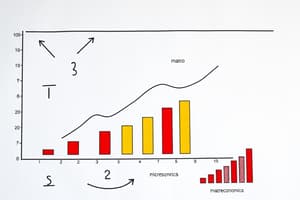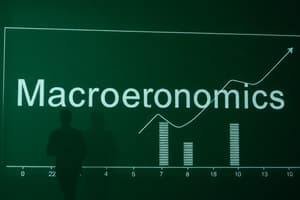Podcast
Questions and Answers
What is the fundamental economic problem that arises from having unlimited human wants and limited resources?
What is the fundamental economic problem that arises from having unlimited human wants and limited resources?
- Supply and Demand
- Economics
- Scarcity (correct)
- Opportunity Cost
Which branch of economics focuses on the economy as a whole, including aspects like inflation and unemployment?
Which branch of economics focuses on the economy as a whole, including aspects like inflation and unemployment?
- Microeconomics
- Development Economics
- Behavioral Economics
- Macroeconomics (correct)
What does opportunity cost refer to in economic terms?
What does opportunity cost refer to in economic terms?
- The value of the next best alternative foregone (correct)
- The benefit gained from the most valuable alternative
- The cost of the resources used in production
- The total cost of an economic decision
In a market economy, what primarily influences decisions regarding production and distribution?
In a market economy, what primarily influences decisions regarding production and distribution?
Which of the following is considered a key indicator in evaluating economic performance?
Which of the following is considered a key indicator in evaluating economic performance?
What characterizes a monopoly in market structures?
What characterizes a monopoly in market structures?
What is the primary focus of fiscal policy in economic management?
What is the primary focus of fiscal policy in economic management?
How does international trade typically get affected?
How does international trade typically get affected?
Flashcards are hidden until you start studying
Study Notes
Key Concepts in Economics
1. Definitions
- Economics: The study of how individuals and societies allocate scarce resources to satisfy unlimited wants.
- Scarcity: Fundamental economic problem of having seemingly unlimited human wants in a world of limited resources.
2. Branches of Economics
- Microeconomics: Focuses on individual agents (consumers and firms) and their interactions in markets.
- Macroeconomics: Studies the economy as a whole, including inflation, unemployment, and economic growth.
3. Basic Economic Principles
- Supply and Demand: Prices and quantities of goods and services determined by their availability and consumer desire.
- Opportunity Cost: The value of the next best alternative foregone when making a choice.
- Marginal Analysis: Examines the benefits and costs of a little more or a little less of an activity.
4. Economic Systems
- Market Economy: Decisions made by individuals and firms based on supply and demand.
- Command Economy: Central authority makes decisions about production and distribution.
- Mixed Economy: Combines elements of market and command economies.
5. Key Indicators
- Gross Domestic Product (GDP): Total value of all goods and services produced in a country in a given time period.
- Unemployment Rate: Percentage of the labor force that is jobless and actively seeking employment.
- Inflation Rate: Rate at which the general level of prices for goods and services is rising.
6. Market Structures
- Perfect Competition: Many firms, identical products, free entry and exit.
- Monopoly: Single firm controls the entire market, unique product, high barriers to entry.
- Oligopoly: Few firms dominate the market, products may be identical or differentiated.
7. Role of Government
- Market Regulation: Ensures competition, protects consumers, and prevents monopolies.
- Fiscal Policy: Government adjusts spending and taxation to influence the economy.
- Monetary Policy: Central bank controls the money supply and interest rates to stabilize the economy.
8. International Economics
- Trade: Exchange of goods and services between countries; can be influenced by tariffs and trade agreements.
- Exchange Rates: Value of one currency for the purpose of conversion to another; affects international trade dynamics.
9. Economic Theories
- Classical Economics: Emphasizes free markets, limited government intervention.
- Keynesian Economics: Advocates for government intervention to manage economic cycles.
- Monetarism: Focuses on controlling money supply to manage inflation.
10. Recent Trends
- Globalization: Increasing interdependence of economies worldwide; impacts trade and labor markets.
- Sustainable Economics: Focus on long-term environmental sustainability along with economic growth.
Key Concepts in Economics
Definitions
- Economics: Examines allocation of scarce resources against unlimited human wants.
- Scarcity: Central issue arising from limited resources versus unlimited wants.
Branches of Economics
- Microeconomics: Analyzes behavior of individual consumers and firms within markets.
- Macroeconomics: Looks at aggregate economic phenomena, including inflation, unemployment, and growth metrics.
Basic Economic Principles
- Supply and Demand: Determines prices and quantities based on availability of goods and consumer preference.
- Opportunity Cost: Represents the value of the alternative foregone when a choice is made.
- Marginal Analysis: Evaluates the incremental benefits and costs associated with small changes in an activity.
Economic Systems
- Market Economy: Relies on individual and firm decisions influenced by supply and demand dynamics.
- Command Economy: Centralized decision-making regarding production and distribution of goods.
- Mixed Economy: Integrates features from both market and command economies for resource distribution.
Key Indicators
- Gross Domestic Product (GDP): Measures total economic output of all goods and services within a country over a specified timeframe.
- Unemployment Rate: Indicates the percentage of the labor force that is jobless and actively seeking work.
- Inflation Rate: Reflects the pace at which the overall price level of goods and services increases.
Market Structures
- Perfect Competition: Characterized by numerous firms producing identical products with no barriers to entry.
- Monopoly: Exists when a single entity controls the market, offering a unique product with high entry barriers.
- Oligopoly: Composed of a few firms that dominate the market, either with similar or differentiated products.
Role of Government
- Market Regulation: Ensures competitive practices, consumer protection, and prevents monopolistic behaviors.
- Fiscal Policy: Involves government adjustments in spending and taxation to influence economic activity.
- Monetary Policy: Central banks regulate money supply and interest rates to maintain economic stability.
International Economics
- Trade: Involves the exchange of goods/services across countries, influenced by tariffs and trade agreements.
- Exchange Rates: Signify the value of a currency compared to another, affecting international trade relations.
Economic Theories
- Classical Economics: Advocates for self-regulating free markets with minimal government intervention.
- Keynesian Economics: Supports government action to mitigate economic fluctuations and maintain stability.
- Monetarism: Emphasizes managing inflation through control of the money supply.
Recent Trends
- Globalization: The growing interdependence of global economies impacting trade flows and labor markets.
- Sustainable Economics: Focuses on maintaining long-term environmental viability alongside economic development.
Studying That Suits You
Use AI to generate personalized quizzes and flashcards to suit your learning preferences.




